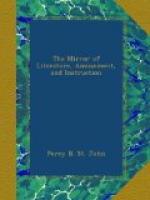_—Blackwood’s Magazine._
* * * * *
WOMAN
Nothing sets so wide a mark “between the vulgar and the noble seed” as the respect and reverential love of womanhood. A man who is always sneering at woman is generally a coarse profligate, or a coarse bigot, no matter which.
* * * * *
ANGLING.
We have often thought that angling alone offers to
man the degree of half-business, half-idleness, which
the fair sex find in their needle-work or knitting,
which, employing the hands, leaves the mind at liberty,
and occupying the attention so far as is necessary
to remove the painful sense of a vacuity, yet yields
room for contemplation, whether upon things heavenly
or earthly, cheerful or melancholy.
—Quarterly
Rev.
* * * * *
THE GATHERER.
“A snapper-up of unconsidered
trifles.”
SHAKSPEARE.
* * * * *
LAUGHTER.
“Laugh and grow fat,” is an old adage; and Sterne tells us, that every time a man laughs, he adds something to his life. An eccentric philosopher, of the last century, used to say, that he liked not only to laugh himself, but to see laughter, and hear laughter. “Laughter, Sir, laughter is good for health; it is a provocative to the appetite, and a friend to digestion. Dr. Sydenham, Sir, said the arrival of a merry-andrew in a town was more beneficial to the health of the inhabitants than twenty asses loaded with medicine.” Mr. Pott used to say that he never saw the “Tailor riding to Brentford,” without feeling better for a week afterwards.
* * * * *
LEGAL PEARL-DIVERS.
Every barrister can “shake his head,” and too often, like Sheridan’s Lord Burleigh, it is the only proof he vouchsafes of his wisdom. Curran used to call these fellows “legal pearl-divers.”—“You may observe them,” he would say, “their heads barely under water—their eyes shut, and an index floating behind them, displaying the precise degree of their purity and their depth.”
* * * * *
GRAMMATICAL LEARNING.
An author left a comedy with Foote for perusal; and on the next visit asked for his judgment on it, with rather an ignorant degree of assurance. “If you looked a little more to the grammar of it, I think,” said Foote, “it would be better.”—“To the grammar of it, Sir! What! would you send me to school again?”—“And pray, Sir,” replied Foote, very gravely, “would that do you any harm?”




